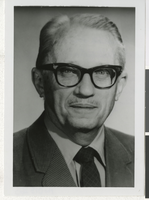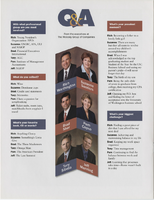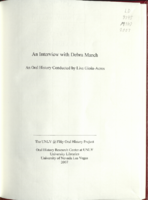Search the Special Collections and Archives Portal
Search Results

Brochure for American Nevada Company, circa 2005
Date
Archival Collection
Description
The brochure describes the history of American Nevada Company, a real estate development firm. The company is based in Henderson, Nevada, and specializes in master planned communities and commercial real estate development.
Text
Betty Krolak oral history interviews
Identifier
Abstract
Oral history interviews with Betty (Elizabeth) Krolak conducted by Irene Rostine on November 25, 1995 and September 23, 1996 for the Women's Research Institute of Nevada (WRIN) Las Vegas Women Oral History Project. In this interview Krolak discusses moving to Las Vegas, Nevada in April of 1962 with her husband and six children. Krolak then discusses her unexpected entry into the real estate business and her experiences in the industry. Krolak talks about the scope of the Las Vegas real estate scene, some of its regulations at the time, and the organizations that had influence over real estate brokers. Finally, Krolak describes opening her own real estate business in 1964.
Archival Collection

Transcript of interview with Suzie Chenin by Barbara Tabach, September 29, 2015
Date
Archival Collection
Description
In this interview, Suzie discusses growing up in Las Vegas, with a strong community of friends, particularly within Temple Beth Sholom. She also talks about her real estate career, both in residential and commercial properties, highlighting some of the successes and challenges. She describes her working relationship with Milton Schwartz, as well her time working with the Greenspuns while selling advertising at the Las Vegas Sun.
Suzie Chenin was born in Cleveland, Ohio, in August of 1949. The next year, her parents, Joseph and Irene Chenin, moved the family to Las Vegas. Her father, a dentist, was stationed at Nellis Air Force Base, becoming the first Jewish dentist in the state ? and only the thirtieth overall. After graduating from Las Vegas High School, Suzie attended Arizona State University. However, she quit school and moved to Los Angeles where she got a job with a large real estate developer. This was her first foray into the industry. A few years later, back in Las Vegas, Suzie got her real estate license, eventually starting her own brokerage firm, Chenin and Associates.
Text

Paul Mannini portrait: photographic print
Date
Archival Collection
Description
Image

Newsletters of the Molasky Group of Companies, 2006-2008
Date
Archival Collection
Description
These quarterly newsletters of the Molasky Group of Companies showcase new and emerging projects for the real estate development firm.
Text
Kay Rodriguez oral history interview
Identifier
Abstract
Oral history interview with Kay Rodriguez conducted by Irene Rostine on November 14, 1997 for the Women's Research Institute of Nevada (WRIN). Rodriguez discusses moving to Las Vegas, Nevada from South Dakota to get a divorce in 1959. Rodriguez describes working as a waitress at the Dunes and the Riviera and making a new life in Las Vegas. She discusses her work in the real estate industry and the challenges of being a working mother. Rodriguez also talks about opening her own real estate office, and the demographics of the real estate industry during the 1960s.
Archival Collection

Tule Springs "Big Dig" clippings and photocopies of publications
Date
Archival Collection
Description
Mixed Content

Transcript of interview with Helen Naugle by Irene Rostine, October 31, 1996
Date
Archival Collection
Description
Prior to 1962, Helen Naugle had only visited Las Vegas once in her life while traveling from Idaho to California for a vacation with her husband and her boss. The group made a quick stop so her boss could interview for a position with EG&G and, as fate would have it, EG&G did not hire Helen’s boss. However, they did extend a job offer to Helen’s husband. A month later, Helen, her two daughters, and her husband became residents of Las Vegas, Nevada. Before moving to Nevada, Helen enjoyed singing in super clubs and performing on her radio show, “Melodies from Meadowland” and working for American Machine and Foundry. Upon her arrival in Las Vegas, Helen went to work for Bonanza Airlines before attending real estate school. In 1963, Helen opened her first office, Bruce Realty, and in 1965, she obtained her Broker’s license. She spent the next ten years selling general real estate. During this period, Helen was an active member of the Board of Realtors, as well as an early participant in the Board’s newly formed Women’s Council. Fate would strike again in Helen’s life while she was visiting her daughter at college in Arizona where she read an article in the Phoenix newspaper about a group of brokers who had formed a networking association to sell hotels and motels across the country. As a result of her initial contact with this association, Helen spent the next four decades selling hotels and motels throughout the State of Nevada, including Las Vegas, Elko, Tonopah, and Wells. She eventually became the first woman President of the American National Hotel-Motel Association. The cultural diversity of hotel and motel buyers would provide Helen with opportunities to travel the world and work with buyers from many different countries and cultural backgrounds. It also led to Helen’s membership in the FIABCI (International Real Estate Federation) and her Certified International Property Specialist and Federation of International Property Consultants certifications. Helen was also selected by the Association to represent the Air Force as “Innkeeper Evaluator” for one year. This honor took her to five Air Force bases in the United States and to Clark Air Force Base in the Philippines. During Helen’s career in hotel and motel real estate sales, she witnessed the transition from “mom-and-pop” American buyers to the influx of international buyers predominately from East India and Asia. The opportunities for helping repeat buyers and sellers gradually went away, as foreign buyers entered the market and tended to resell their properties to friends and family members from their own countries. During the latter part of her career, Helen found time to give back to the Las Vegas community through her volunteer work helping to establish the Scleroderma Foundation of Nevada. She also served on the Board of Directors of the Downtown Las Vegas Partnership where she focused on public safety in the area encompassing the Fremont Street Experience. Her work with both of these organizations allowed her to draw on her career experience for the benefit of others. Whether it was fate, or as Helen put it, she “just lucked into a lot of things,” one thing is certain - Helen Naugle was certainly a trail blazer for women in the hotel-motel niche of the real estate business, not only in Nevada, but across the nation.
Text

Transcript of interview with Debra March by Lisa Gioia-Acres, February 21, 2007
Date
Archival Collection
Description
Text
Arthur Cummings oral history interview
Identifier
Abstract
Oral history interview with Arthur Cummings conducted by Stefani Evans and Peyton McCord on April 26, 2017 for the Building Las Vegas Oral History Project. In this interview, Cummings discusses his early life in Long Island, New York. He recalls his initial interest in real estate, moving to Las Vegas, Nevada to sell houses, and describes the real estate market during the mid-1990s. Cummings explains the importance of maintaining a good credit score, and the idea of financial preparedness as a way to avoid legal problems. Later, Cummings talks about obtaining a real estate license in Nevada, selling homes in Summerlin and the southwest portion of the Las Vegas Valley. Lastly, Cummings discusses building up clientele in the real estate industry.
Archival Collection
